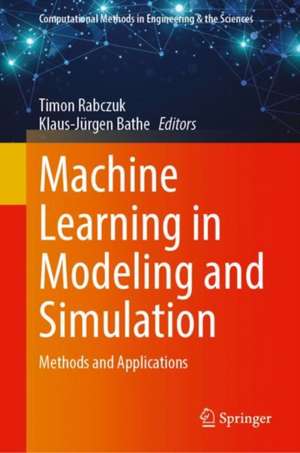Machine Learning in Modeling and Simulation: Methods and Applications: Computational Methods in Engineering & the Sciences
Editat de Timon Rabczuk, Klaus-Jürgen Batheen Limba Engleză Hardback – 4 oct 2023
Preț: 1083.08 lei
Preț vechi: 1353.85 lei
-20% Nou
Puncte Express: 1625
Preț estimativ în valută:
207.27€ • 225.07$ • 174.11£
207.27€ • 225.07$ • 174.11£
Carte tipărită la comandă
Livrare economică 18-24 aprilie
Preluare comenzi: 021 569.72.76
Specificații
ISBN-13: 9783031366437
ISBN-10: 3031366433
Pagini: 451
Ilustrații: IX, 451 p. 150 illus., 135 illus. in color.
Dimensiuni: 155 x 235 mm
Greutate: 0.98 kg
Ediția:1st ed. 2023
Editura: Springer International Publishing
Colecția Springer
Seria Computational Methods in Engineering & the Sciences
Locul publicării:Cham, Switzerland
ISBN-10: 3031366433
Pagini: 451
Ilustrații: IX, 451 p. 150 illus., 135 illus. in color.
Dimensiuni: 155 x 235 mm
Greutate: 0.98 kg
Ediția:1st ed. 2023
Editura: Springer International Publishing
Colecția Springer
Seria Computational Methods in Engineering & the Sciences
Locul publicării:Cham, Switzerland
Cuprins
Machine Learning in Computer-Aided Engineering.- Artificial Neural Networks.- Gaussian Processes.- Machine Learning Methods for Constructing Dynamic Models from Data.- Physics-Informed Neural Networks: Theory and Applications.- Physics-Informed Deep Neural Operator Networks.- Digital Twin for Dynamical Systems.- Reduced Order Modeling.- Regression Models for Machine Learning.- Overview on Machine Learning Assisted Topology Optimization Methodologies.- Mixed-variable Concurrent Material, Geometry and Process Design in Integrated Computational Materials Engineering.- Machine Learning Interatomic Potentials: Keys to First-principles Multiscale Modeling.
Notă biografică
Timon Rabczuk is Professor of Computational Mechanics at Bauhaus University Weimar. He has published more than 650 articles and 2 books. Timon is editor in Chief of CMC-Computers, Materials and Continua, associate editor of International Journal of Impact Engineering, Applied Physics A, International Journal of Mechanics and Materials in Design, Underground Space, Defense Technology and executive editor of FSCE-Frontiers of Structural and Civil Engineering. He is a member of the European Academy of Sciences and Arts. His research interests include Computational Science, Integrated Computational Materials Engineering and the numerical solution of partial differential equations.
Klaus-Jürgen Bathe is Professor of Mechanical Engineering at the Massachusetts Institute of Technology. Professor Bathe is also the Founder of the company ADINA R & D recently acquired by Bentley Systems. He has published numerous articles, six textbooks, two books onhis life experiences, and is an Editor-in-Chief of the international journal Computers and Structures. He has been honored by the ASME, ASCE, U.S. National Academy of Engineering, through three awards at M.I.T., and through many honorary doctorates for his teaching, his pioneering and widely used fundamental contributions in computational mechanics, and for bridging the world between Academia and Industry.
Textul de pe ultima copertă
Machine learning (ML) approaches have been extensively and successfully employed in various areas, like in economics, medical predictions, face recognition, credit card fraud detection, and spam filtering. There is clearly also the potential that ML techniques developed in Engineering and the Sciences will drastically increase the possibilities of analysis and accelerate the design to analysis time. With the use of ML techniques, coupled to conventional methods like finite element and digital twin technologies, new avenues of modeling and simulation can be opened but the potential of these ML techniques needs to still be fully harvested, with the methods developed and enhanced. The objective of this book is to provide an overview of ML in Engineering and the Sciences presenting fundamental theoretical ingredients with a focus on the next generation of computer modeling in Engineering and the Sciences in which the exciting aspects of machine learning are incorporated. The book is of value to any researcher and practitioner interested in research or applications of ML in the areas of scientific modeling and computer aided engineering.
Caracteristici
Comprehensive state-of-the-art book on scientific machine learning approaches in modelling & simulation Covers the wide range of PDEs, uncertainty, optimization, inverse analysis, constitutive modelling & material design Focuses on engineering applications in modelling & material design




